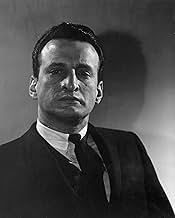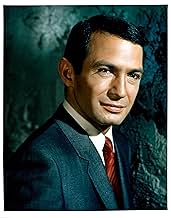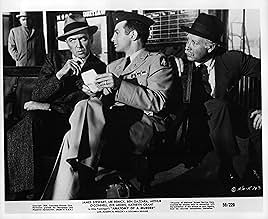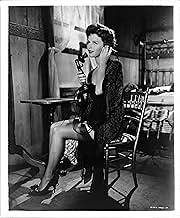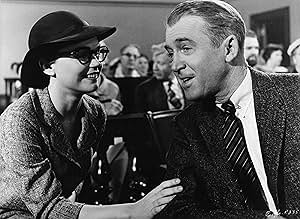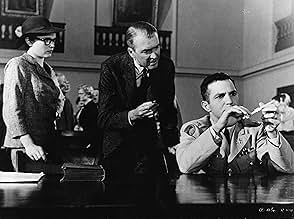In un processo per omicidio, l'imputato afferma di aver subito una follia temporanea dopo che la vittima ha violentato sua moglie. Qual è la verità? Arriverà a vincere il suo caso?In un processo per omicidio, l'imputato afferma di aver subito una follia temporanea dopo che la vittima ha violentato sua moglie. Qual è la verità? Arriverà a vincere il suo caso?In un processo per omicidio, l'imputato afferma di aver subito una follia temporanea dopo che la vittima ha violentato sua moglie. Qual è la verità? Arriverà a vincere il suo caso?
- Candidato a 7 Oscar
- 10 vittorie e 18 candidature totali
Recensioni in evidenza
Well filmed, beautifully acted, and painstakingly directed, this film deserves the highest praise.
James Stewart brings his customary stammering, quirky charm to a role that could have easily become overwhelmingly serious. Lee Remick is seen establishing her early image as the somehow fragile, undeniably seductive pawn (see also "A Face in The Crowd"), while Gazzara wavers intensely somewhere between heartless murderer and protective husband. The supporting cast is strong, creating a human backdrop for the senior players, keeping the story in the real world, effectively preventing this from becoming an exercise in legal theory.
This film is noteworthy for a myriad of reasons, but most specifically because it addresses the still controversial issue of acquaintance rape, and presents us with a victim of questionable morals. At the same time our murder victim is seen as a monster, then a friend and father. There really are no heroes here, no noble defenders, no pristine heroines, no completely innocent bystanders...both sides take their turns pointing fingers, each claiming that the other only got what they deserved.
We are forced to re-evaluate our thoughts on what constitutes justifiable homicide--the unwritten law that Manion speaks of in the film versus the law as written that Biegler must now interpret. This manipulation of intended meaning sets a somewhat tragic precedent evident in the legal system we work within today.
This film is highly entertaining, and excellent for discussion. Watch it with some of your more philosophical friends.
James Stewart brings his customary stammering, quirky charm to a role that could have easily become overwhelmingly serious. Lee Remick is seen establishing her early image as the somehow fragile, undeniably seductive pawn (see also "A Face in The Crowd"), while Gazzara wavers intensely somewhere between heartless murderer and protective husband. The supporting cast is strong, creating a human backdrop for the senior players, keeping the story in the real world, effectively preventing this from becoming an exercise in legal theory.
This film is noteworthy for a myriad of reasons, but most specifically because it addresses the still controversial issue of acquaintance rape, and presents us with a victim of questionable morals. At the same time our murder victim is seen as a monster, then a friend and father. There really are no heroes here, no noble defenders, no pristine heroines, no completely innocent bystanders...both sides take their turns pointing fingers, each claiming that the other only got what they deserved.
We are forced to re-evaluate our thoughts on what constitutes justifiable homicide--the unwritten law that Manion speaks of in the film versus the law as written that Biegler must now interpret. This manipulation of intended meaning sets a somewhat tragic precedent evident in the legal system we work within today.
This film is highly entertaining, and excellent for discussion. Watch it with some of your more philosophical friends.
If you haven't yet seen Anatomy of a Murder, you've got to buy a copy and host a movie night as soon as you can. You're going to want to own your own copy, since this exciting courtroom drama can be enjoyed over and over again. I've lost track of how many times I've seen it, and it never gets old. I'm a huge fan of the boundary-pushing director Otto Preminger, and he once again pushed the envelope of the censors in 1959. In this movie, the words "rape" and "panties" are spoken several times - shocking at that time!
James Stewart, in his silver-haired charm, stars as a defense attorney with passions outside the courtroom. He loves fishing, he loves jazz music, and he loves the sight of a good-looking woman. When the latter appears in his office, in the form of Lee Remick, asking for his help in her husband's upcoming trial, he agrees to take the case. Lee is beautiful and sexy, and she brings out such a flirtatious spark in Jimmy. Her husband, Ben Gazarra, will be on trial for murdering the man who raped and beat her up. It seems like an easy case, right? Not exactly.
There's much more to the situation than meets the eye. As Jimmy explains to Ben on their first, memorable meeting: "There are four ways I can defend murder. . ." I love that scene. It's clever and concise without seeming glib or artificial. The chemistry between every member of the cast is so electric, you can feel the words bouncing off the actors. Jimmy and Ben spar with their eyes, George C. Scott and Jimmy love to hate each other, and George practically undresses Lee with his words. Who knew a murder trial could have so much sex appeal?
The script is intelligent, the performances are energetic, and the subject matter is modern for its time. There are so many reasons to watch it, and so many things to appreciate when you do watch it, that you'll keep coming back to it over the years as I have.
James Stewart, in his silver-haired charm, stars as a defense attorney with passions outside the courtroom. He loves fishing, he loves jazz music, and he loves the sight of a good-looking woman. When the latter appears in his office, in the form of Lee Remick, asking for his help in her husband's upcoming trial, he agrees to take the case. Lee is beautiful and sexy, and she brings out such a flirtatious spark in Jimmy. Her husband, Ben Gazarra, will be on trial for murdering the man who raped and beat her up. It seems like an easy case, right? Not exactly.
There's much more to the situation than meets the eye. As Jimmy explains to Ben on their first, memorable meeting: "There are four ways I can defend murder. . ." I love that scene. It's clever and concise without seeming glib or artificial. The chemistry between every member of the cast is so electric, you can feel the words bouncing off the actors. Jimmy and Ben spar with their eyes, George C. Scott and Jimmy love to hate each other, and George practically undresses Lee with his words. Who knew a murder trial could have so much sex appeal?
The script is intelligent, the performances are energetic, and the subject matter is modern for its time. There are so many reasons to watch it, and so many things to appreciate when you do watch it, that you'll keep coming back to it over the years as I have.
Lawyer Paul Biegler takes the case of Lt. Manion who killed a man after he discovered he had raped his wife, Laura. Biegler realises that the cards are not all in his favour and begins to ensure that the facts are spun in his favour as much as possible during the trial.
This film caused a stir back when it was released supposedly over the dialogue that contained words not used before in a motion picture. However it was more likely that the furore was over the cynical view of the legal profession that the film has. The story is good, but if you're looking for a John Grisham type film with shouting and ridiculous twists in the final reel then you're in the wrong place. What we have here is a clever, interesting story that moves slowly focusing on Biegler rather than twists and turns in the actual plot.
Biegler is sort of clean cut, but he seems like a real lawyer he twists facts and prompts lies in order to improve his case. The various tricks and theatrical shenanigans during the trail are also well observed. The characters are all interesting with only the judge seeming like a dull stereotype.
James Stewart is excellent and helps make the shifty lawyer more likeable and relatable. Remick is excellent as the flirtatious Laura while Gazzara is cool as the accused. George C Scott doesn't have much to do, but does well anyway.
Overall a very enjoyable courtroom thriller it lacks the fireworks of modern legal dramas but has a nice cynical edge to it that shows it isn't as in awe of the law as Grisham is.
This film caused a stir back when it was released supposedly over the dialogue that contained words not used before in a motion picture. However it was more likely that the furore was over the cynical view of the legal profession that the film has. The story is good, but if you're looking for a John Grisham type film with shouting and ridiculous twists in the final reel then you're in the wrong place. What we have here is a clever, interesting story that moves slowly focusing on Biegler rather than twists and turns in the actual plot.
Biegler is sort of clean cut, but he seems like a real lawyer he twists facts and prompts lies in order to improve his case. The various tricks and theatrical shenanigans during the trail are also well observed. The characters are all interesting with only the judge seeming like a dull stereotype.
James Stewart is excellent and helps make the shifty lawyer more likeable and relatable. Remick is excellent as the flirtatious Laura while Gazzara is cool as the accused. George C Scott doesn't have much to do, but does well anyway.
Overall a very enjoyable courtroom thriller it lacks the fireworks of modern legal dramas but has a nice cynical edge to it that shows it isn't as in awe of the law as Grisham is.
I have tried more cases than I can remember - hundreds. This movie, more than any other, comes closet to real life.
In criminal cases., the first and most important thing is - the phone call. That's right, getting the case.
Next comes the 'talk.' An attorney has to inform the client of the possible outcomes given the facts. In Anatomy of a Murder, the main facts are 'undisputed', that is, there is no doubt that the defendant killed the victim.
Given that fact, there are only so many possible defenses - and so Jimmy Stewart, in one of the best performances of his career, relates those defenses to Ben Gazzara, in one of his best performances.
Along the way, we are treated to George C. Scott's premiere performance on screen - and it is is magnificent.
Did I mention how incredible and sexy and vulnerable Lee Remick is?
And the rest of the cast is also as good as it gets.
And then there's the Duke Ellington score (he won a Grammy) and the Wendell Mayes screenplay and the B/W cinematography by Sam Leavitt (The Defiant Ones (Oscar-winner), A Star is Born (1954)).
Watch this movie to see how to make a crime drama. There is nothing as good as it is - nothing.
As a courtroom drama, "Anatomy of a Murder" would be hard to surpass. It is a first-class production with an interesting and unpredictable story plus a strong cast. It works admirably, both as a story and as a portrayal of the workings of the law. It avoids the labored dramatics and contrived resolutions in which so many movies of the genre indulge, and it also declines to shy away from pointing out the more ill-conceived features of the legal system.
From his first scene, James Stewart pulls the viewer right into the world of lawyer Paul Biegler. It takes little time before you come to know him and to get a pretty good idea of what his life is like. His scenes with Arthur O'Connell work well in rounding out the picture. The two are neither heroic nor brilliant, but simply sympathetic and believable.
Into Biegler's world then come the characters played by Ben Gazzara and Lee Remick, a married couple with more than their share of faults. By making them less than ideal clients, the movie takes a chance on losing the audience's sympathy, but it adds credibility and complexity to the story. Both roles are played well - again, it seems as if you know a lot more about them than is specifically stated.
When George C. Scott enters the picture, he adds yet another dimension. His character arrives at just the right time to complicate the plot, and his legal skirmishing with Stewart makes some dry material come to life in an interesting way. Eve Arden also has some good moments, and her character is used in just the right amount to add some amusement without causing a distraction from the main story. It's also interesting to see Joseph Welch as the judge, and his portrayal works well enough.
Otto Preminger holds everything together nicely, with the right amount of detail and a pace that keeps the story moving steadily. The result is a very nice contrast to the many run-of-the mill legal/courtroom movies that present such an idealized view of the justice system. It maintains a careful balance, making clear the flaws and unpleasant realities of the system, yet never taking cheap shots either. And it's also an interesting and involved story, one of the most carefully-crafted of its kind.
From his first scene, James Stewart pulls the viewer right into the world of lawyer Paul Biegler. It takes little time before you come to know him and to get a pretty good idea of what his life is like. His scenes with Arthur O'Connell work well in rounding out the picture. The two are neither heroic nor brilliant, but simply sympathetic and believable.
Into Biegler's world then come the characters played by Ben Gazzara and Lee Remick, a married couple with more than their share of faults. By making them less than ideal clients, the movie takes a chance on losing the audience's sympathy, but it adds credibility and complexity to the story. Both roles are played well - again, it seems as if you know a lot more about them than is specifically stated.
When George C. Scott enters the picture, he adds yet another dimension. His character arrives at just the right time to complicate the plot, and his legal skirmishing with Stewart makes some dry material come to life in an interesting way. Eve Arden also has some good moments, and her character is used in just the right amount to add some amusement without causing a distraction from the main story. It's also interesting to see Joseph Welch as the judge, and his portrayal works well enough.
Otto Preminger holds everything together nicely, with the right amount of detail and a pace that keeps the story moving steadily. The result is a very nice contrast to the many run-of-the mill legal/courtroom movies that present such an idealized view of the justice system. It maintains a careful balance, making clear the flaws and unpleasant realities of the system, yet never taking cheap shots either. And it's also an interesting and involved story, one of the most carefully-crafted of its kind.
Lo sapevi?
- QuizPart of the controversy surrounding this movie was because it included use of the words "bitch", "contraceptive", "panties", "penetration", "rape", "slut", and "sperm".
- BlooperJames Stewart goes to negotiate with the DA at the courthouse. Sign over the DA's door is misspelled "Proseguting attorney". Actually this is not true. It's possible to compare the c with the g at the end of the word, and you can see the g has a descending stroke. It's just a foible of the font.
- Citazioni
Paul Biegler: As a lawyer, I've had to learn that people aren't just good or just bad. People are many things.
- ConnessioniFeatured in Portrait of an Actor (1971)
I più visti
Accedi per valutare e creare un elenco di titoli salvati per ottenere consigli personalizzati
Dettagli
- Data di uscita
- Paese di origine
- Lingua
- Celebre anche come
- Anatomía de un asesinato
- Luoghi delle riprese
- Tripoli Bar, Ishpeming, Michigan, Stati Uniti(interiors: Thunder Bay Inn)
- Azienda produttrice
- Vedi altri crediti dell’azienda su IMDbPro
Botteghino
- Lordo in tutto il mondo
- 194 USD
- Tempo di esecuzione2 ore 41 minuti
- Colore
- Mix di suoni
- Proporzioni
- 1.85 : 1
Contribuisci a questa pagina
Suggerisci una modifica o aggiungi i contenuti mancanti

Divario superiore
What is the Hindi language plot outline for Anatomia di un omicidio (1959)?
Rispondi


